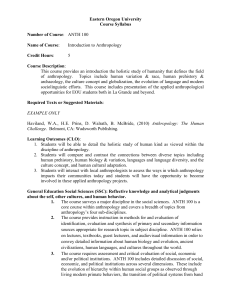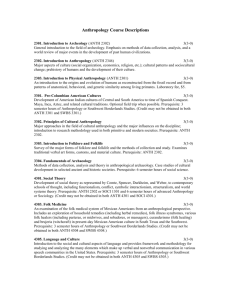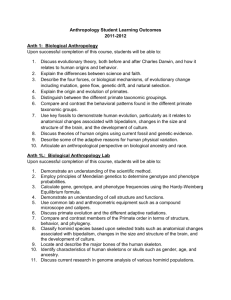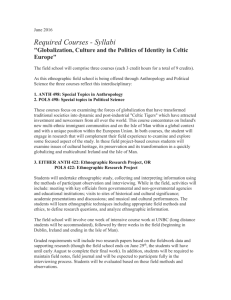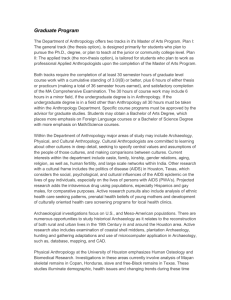Department of Anthropology
advertisement
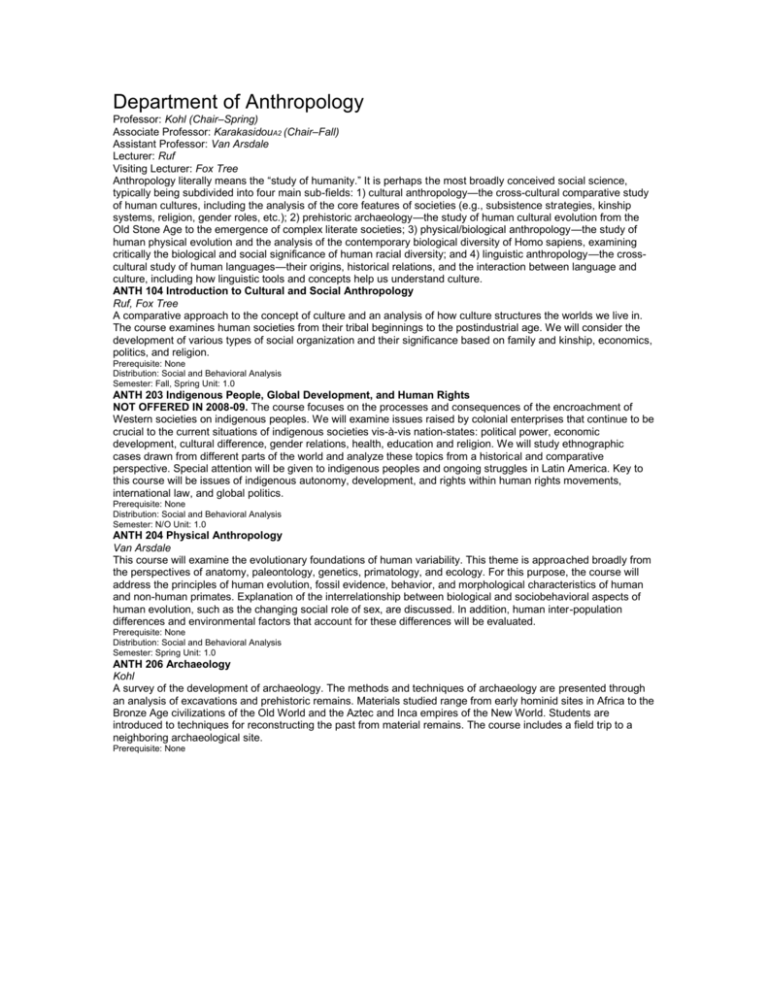
Department of Anthropology Professor: Kohl (Chair–Spring) Associate Professor: KarakasidouA2 (Chair–Fall) Assistant Professor: Van Arsdale Lecturer: Ruf Visiting Lecturer: Fox Tree Anthropology literally means the “study of humanity.” It is perhaps the most broadly conceived social science, typically being subdivided into four main sub-fields: 1) cultural anthropology—the cross-cultural comparative study of human cultures, including the analysis of the core features of societies (e.g., subsistence strategies, kinship systems, religion, gender roles, etc.); 2) prehistoric archaeology—the study of human cultural evolution from the Old Stone Age to the emergence of complex literate societies; 3) physical/biological anthropology—the study of human physical evolution and the analysis of the contemporary biological diversity of Homo sapiens, examining critically the biological and social significance of human racial diversity; and 4) linguistic anthropology—the crosscultural study of human languages—their origins, historical relations, and the interaction between language and culture, including how linguistic tools and concepts help us understand culture. ANTH 104 Introduction to Cultural and Social Anthropology Ruf, Fox Tree A comparative approach to the concept of culture and an analysis of how culture structures the worlds we live in. The course examines human societies from their tribal beginnings to the postindustrial age. We will consider the development of various types of social organization and their significance based on family and kinship, economics, politics, and religion. Prerequisite: None Distribution: Social and Behavioral Analysis Semester: Fall, Spring Unit: 1.0 ANTH 203 Indigenous People, Global Development, and Human Rights NOT OFFERED IN 2008-09. The course focuses on the processes and consequences of the encroachment of Western societies on indigenous peoples. We will examine issues raised by colonial enterprises that continue to be crucial to the current situations of indigenous societies vis-à-vis nation-states: political power, economic development, cultural difference, gender relations, health, education and religion. We will study ethnographic cases drawn from different parts of the world and analyze these topics from a historical and comparative perspective. Special attention will be given to indigenous peoples and ongoing struggles in Latin America. Key to this course will be issues of indigenous autonomy, development, and rights within human rights movements, international law, and global politics. Prerequisite: None Distribution: Social and Behavioral Analysis Semester: N/O Unit: 1.0 ANTH 204 Physical Anthropology Van Arsdale This course will examine the evolutionary foundations of human variability. This theme is approached broadly from the perspectives of anatomy, paleontology, genetics, primatology, and ecology. For this purpose, the course will address the principles of human evolution, fossil evidence, behavior, and morphological characteristics of human and non-human primates. Explanation of the interrelationship between biological and sociobehavioral aspects of human evolution, such as the changing social role of sex, are discussed. In addition, human inter-population differences and environmental factors that account for these differences will be evaluated. Prerequisite: None Distribution: Social and Behavioral Analysis Semester: Spring Unit: 1.0 ANTH 206 Archaeology Kohl A survey of the development of archaeology. The methods and techniques of archaeology are presented through an analysis of excavations and prehistoric remains. Materials studied range from early hominid sites in Africa to the Bronze Age civilizations of the Old World and the Aztec and Inca empires of the New World. Students are introduced to techniques for reconstructing the past from material remains. The course includes a field trip to a neighboring archaeological site. Prerequisite: None Distribution: Social and Behavioral Analysis Semester: Fall Unit: 1.0 ANTH 207 Hominid Evolution Van Arsdale The hominid fossil record provides direct evidence for the evolution of humans and our ancestors through the past 5-7 million years. This will provide an overview of human evolutionary history from the time of our last common ancestor with the living great apes up through the emergence of “modern” humans. Emphasis is placed on evolutionary mechanisms, and context is provided through an understanding of the pre-human primates. The human story begins with origins and the appearance of unique human features such as bipedality, the loss of cutting canines, the appearance of continual sexual receptivity, births requiring midwifery, and the development of complex social interactions. An early adaptive shift sets the stage for the subsequent evolution of intelligence, technology, and the changes in physical form that are the consequence of the unique feedback system involving cultural and biological change. Prerequisite: None Distribution: Social and Behavioral Analysis Semester: Fall Unit: 1.0 ANTH 208 Archaeological Science Lechtman (at MIT) An introduction to scientific techniques used in contemporary archaeology. Using a case study format, faculty from the Boston-wide Center for Materials Research Archaeology and Ethnology (CMRAE) present different methods for studying such topics as reconstruction of ancient environments; dating techniques; assessing the diets of ancient populations; and sourcing artifacts through chemical and physical analyses. Prerequisite: One year college-level physics or chemistry (or equivalent, by permission of the instructor). Distribution: Natural and Physical Science Semester: Spring Unit: 1.0 ANTH 209 Forensic Anthropology Van Arsdale The identification of human remains for criminological and political purposes is widespread. This course explores issues in the identification and interpretation of human bones including methods for determining sex, age, stature, and ancestry as well as for identifying pathologies and anomalies. The course will pay particular attention to those anatomical elements, both soft tissue and bones, that aid in the reconstruction of individuals and their lifestyles. In addition, the course explores search and recovery techniques, crime scene analysis, the use of DNA in solving crimes, and the role of forensic anthropology in the investigation of mass fatalities from both accidents and human rights violations. It also addresses ballistics and the use of photography in forensic investigation. Prerequisite: None Distribution: Social and Behavioral Analysis Semester: Fall Unit: 1.0 ANTH 211/RAST 211 Wintersession Program in the Republic of Georgia Kohl Students travel to Tbilisi, Georgia for Wintersession. They attend lectures in English at Tbilisi State University on Georgian history, language and culture and on contemporary political developments there and visit sites of historical interest in and around Tbilisi. They live with Georgian families and spend three weeks completing a selfdesigned internship with a local organization. Students may register for either ANTH 211 or RAST 211 and credit will be granted accordingly. Not offered every year. Subject to Dean’s Office approval. Prerequisite: One course in anthropology or Russian area studies. Application required. Distribution: Social and Behavioral Analysis or Historical Studies Semester: Wintersession Unit: 0.5 ANTH 214 Race and Human Variation Van Arsdale This is a course about race concepts and human biological variation, viewed from historical and biological perspectives. This course thus has two intertwined emphases. One is placed on the historical connection between science and sociopolitical ideologies and policies. The other is on the evolutionary origin of human biological and cultural diversity. Through lecture and discussion section, topics explored include the role of polygenism, historically and in current scientific thought; biological determinism and scientific racism; the Holocaust and other examples of “applied biology”; and the role of the race concept in current scientific debates, such as those over the place of the Neanderthals in human evolution, as well as those over the book The Bell Curve. The course seeks to guide students through a critical exercise in studying the evolutionary origins of contemporary human biological variation and its close relationship with scientific and popular concepts of race. Prerequisite: None Distribution: Social and Behavioral Analysis Semester: Spring Unit: 1.0 ANTH 217 Peoples, Histories, and Cultures of the Balkans NOT OFFERED IN 2008-09. The Balkan region has been a major trade and cultural crossroads for millennia and encompasses a variety of landscapes, peoples, and cultures. We will read authoritative historical studies and ethnographies as well as short stories, poetry, books of travel and fiction. We will consider the legacy of the classical world, the impact of Islam, the emergence of European commercial empires, the impact of the European Enlightenment in national movements, the emergence of modernization, and the socialist experiments in the hinterlands. The course offers a critical overview of the politics of historical continuity and the resurgence of Balkan nationalisms during the last decade of the twentieth century. Prerequisite: None Distribution: Social and Behavioral Analysis Semester: N/O Unit: 1.0 ANTH 218 Everyday Life in South Asia Lynch (Olin) NOT OFFERED IN 2008-09. This course is an anthropological introduction to South Asia, with an emphasis on India and Sri Lanka. It focuses on the daily lives and experiences of real people as portrayed in ethnographies, novels, and films. The emphasis will be on the dynamics of power in which everyday lives are embedded. Topics include labor, gender, modernity, ethnicity, development, and globalization. Specific cases include practices of childbirth in South India, masculinity and ethnic identity in Sri Lanka, damming and displacement along the Narmada River, global garment production in Sri Lanka, and the Bhopal chemical disaster. Prerequisite: None Distribution: Social and Behavioral Analysis Semester: N/O Unit: 1.0 ANTH 220 Identity and Community Formation: Asian American Perspectives NOT OFFERED IN 2008-09. This course offers analytic tools for grappling with the historical and contemporary complexities of Asian American identification and community formation. Each section of this course introduces students to different theoretical frames for exploring the meaningful contours of the term “Asian American” in relation to other racialized and ethnic groups in the U.S. We will pay particular attention to the historical conditions and ongoing processes for the social formation of persons and collectivities under the rubric of “Asian American” as well as examine multiplicities, contradictions, and gaps of Asian American identifications and politics. Students will learn to critically think about Asian American identification in the wider contexts of orientalism, U.S. imperialism and nationalism, racialization and racism, state governmentality, economic restructuring, transnationalism and other social processes. Prerequisite: None Distribution: Social and Behavioral Analysis Semester: N/O Unit: 1.0 ANTH 222/PEAC 259 Redressing Savagery: The Cultural Performance of Peace and Aggression Fox Tree Societies have long used the supposed savagery of dehumanized “others” to justify wars, while re-framing their own warfare as less savage, or even constructive. This course uses anthropological concepts to explore this central irony of war and related collective injustices by deconstructing cultural notions of savagery and by examining how savagery can be redressed, both in the restorative sense of atonement and compensation and in the sense of deceptive re-clothing that conceals continuing abuses. Students will analyze artistic, testimonial, philosophical, and popular notions of savagery and redress. Specific cases include the Trojan War, colonization of the Americas, internment, genocide, the war on terror, and ongoing nation-building projects. Students may register for either ANTH 222 or PEAC 259 and credit will be granted accordingly. Prerequisite: One course in either Anthropology or Peace and Justice Studies. Distribution: Social and Behavioral Analysis or Religion, Ethics, and Moral Philosophy Semester: Spring Unit: 1.0 ANTH 223 Contemporary Chinese Society NOT OFFERED IN 2008-09. This course draws from anthropological and cultural-historical frameworks to explore the contemporary terrain of China in relation to an emergent “New World (Dis)Order.” While introducing students to key concepts and major historical developments in twentieth-century China, the course will focus largely on ethnographic studies of social change and everyday life betwixt and between the Mao (1949–1978) and Post-Mao (1978–present) eras. Topics examined include nation-building, Chinese modernities, capitalist development, gendered desires, class inequalities, religious revivalism and cosmopolitan identities. Students will be asked to critically and creatively think about change and continuity in contemporary China not only in terms of the organization of Chinese political institutions, but also in relation to the role of Chinese diasporic populations and other transnational and globalizing forces in producing spatial-temporal imaginaries. Prerequisite: None Distribution: Social and Behavioral Analysis Semester: N/O Unit: 1.0 ANTH 232 Anthropology of the Media NOT OFFERED IN 2008-09. This course introduces students to key analytic frameworks through which media and the mediation of culture have been examined. Using an anthropological approach, students will explore how media as representation and as cultural practice have been fundamental to the (trans)formation of modern sensibilities and social relations. We will examine various technologies of mediation—from the Maussian body as “Man’s first technical instrument” to print capitalism, radio and cassette cultures, cinematic and televisual publics, war journalism, the digital revolution and the political milieu of spin and public relations. Themes in this course include 1) media in the transformation of the senses, 2) media in the production of cultural subjectivities and publics, and 3) the social worlds and cultural logics of media institutions and sites of production. Prerequisite: None Distribution: Social and Behavioral Analysis Semester: N/O Unit: 1.0 ANTH 233 Language and Culture NOT OFFERED IN 2008-09. An introduction to linguistic anthropology. We will explore the interaction of language and culture, learning how anthropology adds to our understandings of language, and how linguistic tools and concepts likewise help us understand culture. Topics to be examined include the nature, origin, and history of language; folk understandings of language; orality vs. literacy; how culture mediates communication, cognition, and meaning; the ethnography of speaking; language’s mediation of gender and ethnic/racial/national identity; the politics of bilingualism; and the power of language. Case studies will deal with languages from around the world, with emphasis on the Americas. Assignments (including basic fieldwork) will offer training in linguisticanthropological methodologies. Prerequisite: None Distribution: Social and Behavioral Analysis Semester: N/O Unit: 1.0 ANTH 234/ES 234 Cultural Ecology NOT OFFERED IN 2008-09. This course explores theoretical and methodological issues in the study of human culture and social activity in relation to ecological systems and the environment. Readings include both classic studies as well as contemporary research, with particular emphasis placed on the various dimensions and scales of social organization and activity, and on the role of cultural, religious, and political institutions in shaping ecological relationships as well as economic behavior. Students may register for either ANTH 234 or ES 234 and credit will be granted accordingly. Prerequisite: None Distribution: Social and Behavioral Analysis Semester: N/O Unit: 1.0 ANTH 238 The Vulnerable Body: Anthropological Understandings NOT OFFERED IN 2008-09. This course begins with the assumption that the human body is a unit upon which collective categories are engraved. These categories can vary from social values, to religious beliefs, to feelings of national belonging, to standards of sexuality and beauty. Readings in this course will concentrate around the classic and recent attempts in the social and historical sciences to develop ways of understanding this phenomenon of “embodiment.” We will begin with an overview of what is considered to be the “construction” of the human body in various societies and investigate how the body has been observed, experienced, classified, modified, and sacralized in different social formations. Prerequisite: None Distribution: Social and Behavioral Analysis Semester: N/O Unit: 1.0 ANTH 242 “Civilization” and “Barbarism” during the Bronze Age, 3500–2000 B.C.E. NOT OFFERED IN 2008-09. A review of the earliest emergence of state-stratified societies in the Old World (Pharaonic Egypt, Mesopotamia, the Indus Valley, and Shang China) and their integration through trade, conflict, migrations, and diffusions of technologies, particularly metalworking, with neighboring illiterate societies on their peripheries. The course concludes with a comparison with core-periphery relations in pre-Columbian Mesoamerica and Peru. Prerequisite: None Distribution: Historical Studies or Social and Behavioral Analysis Semester: N/O Unit: 1.0 ANTH 247 Societies and Cultures of Eurasia Kohl A survey of the non-Russian, largely non-European peoples of the former Soviet Union (particularly ethnic groups in Transcaucasia, Central Asia, and Siberia). The course will review how traditional cultures in these areas changed during the years of Soviet rule and will examine the problems they face today with newly gained independence or greatly increased autonomy. Nationality policies of the former Soviet Union will be discussed with a particular emphasis on how they affect the current territorial disputes and conflicts among different ethnic groups (e.g., the undeclared war between Armenia and Azerbaijan over the enclave of Nagorno-Karabagh). Prerequisite: One unit in anthropology, economics, history, political science, or sociology. Distribution: Historical Studies or Social and Behavioral Analysis Semester: Fall Unit: 1.0 ANTH 250 Research or Individual Study Prerequisite: 104 and permission of the instructor. Distribution: None Semester: Fall, Spring Unit: 1.0 ANTH 250H Research or Individual Study Prerequisite: 104 and permission of the instructor. Distribution: None Semester: Fall, Spring Unit: 0.5 ANTH 251 Cultures of Cancer Karakasidou This course critically examines cancer as a pervasive disease and a metaphor of global modern cultures. Students will be exposed to the ways cancer is perceived as a somatic and social standard within locally constructed cognitive frameworks. They will investigate the scientific and emotional responses to the disease and the ways cancer challenges our faith and spirituality, our ways of life, notions of pollution and cleanliness and our healing strategies. This approach to cancer is comparative and interdisciplinary and focuses on how specialists in different societies have described the disease, how its victims in different cultures have narrated their experiences, how causality has been perceived, and what interventions (sacred or secular) have been undertaken as therapy and prevention. Prerequisites: None Distribution: Social and Behavioral Analysis Semester: Fall Unit: 1.0 ANTH 256 A History of Archaeological Thought Kohl A History of Archaeological Thought is an intermediate level course intended to introduce students to the development of archaeological theory from the early nineteenth-century realization that the remote past could be reconstructed solely on the basis of the archaeological record to later developments, such as attempts to identify ethnic/linguistic groups exclusively from material remains. It will trace the emergence of archaeology as a sub-field within anthropology and its continuing close interaction with broader developments in anthropological theory. The course contrasts perspectives that emphasize internal social evolution and adaptation to local environmental settings with post-modern responses that stress multiple perspectives on a contingent past. Students will be introduced to different theoretical approaches to interpreting the archaeological record, such as cultural ecology, feminist or engendered archaeology, Marxist historical materialism, world systems theory, and so-called symbolic/cognitive archaeology. The suitability of these theoretical approaches for interpreting the archaeological record will be critically examined. Prerequisite: 104 or 206 or permission of instructor. Distribution: Social and Behavioral Analysis Semester: Spring Unit: 1.0 ANTH 260 Cultures and Peoples of Mesoamerica Fox Tree This course explores the complex history, politics, and cultures of the region that includes Mexico, Guatemala, El Salvador, Honduras, Belize, and Nicaragua. Critically examining diverse scholarship, we will examine ancient, colonial, and “post-colonial” Mesoamerican civilizations, and their continuing influence on North American society. Topics include the legacies of pre-Hispanic civilizations; colonization and conflict; indigenous identity and activism; political-economic changes; ethnicity and gender; and transnational flows of people, commodities, and ideas. Special attention is given to the Maya Area and to recent political and cultural activism in Chiapas, Guatemala, and Mesoamerican enclaves in North America. Lectures, readings, and discussions will draw parallels to other parts of the world. Prerequisite: None Distribution: Social and Behavioral Analysis Semester: Fall Unit: 1.0 ANTH 269 Anthropology of Gender, Marriage, and the Family NOT OFFERED IN 2008-09. An examination of the variations in gender and family life globally. Comparisons of patterns of behavior and belief systems surrounding marriage, sexuality, parenthood, male and female power, and masculine and feminine temperament. Emphasis on the ways kinship and family life organize society and the ways gender is constructed in conjunction with other identities such as race, class, and nationality. Discussion of the cultural context of male violence against women and women’s rights as human rights. Prerequisite: None Distribution: Social and Behavioral Analysis Semester: N/O Unit: 1.0 ANTH 300 Ethnographic Methods and Ethnographic Writing Ruf An exploration of anthropological research and writing through the analytical and practical study of “fieldwork” and “ethnography.” Examines a variety of anthropological research methods and genres of representation paying particular attention to questions of knowledge, location, evidence, ethics, power, translation, experience, and the way theoretical problems can be framed in terms of ethnographic research. Students will be asked to apply critical knowledge in a fieldwork project of their own design. Prerequisite: 301 or two 200-level units in anthropology, economics, history, political science, or sociology, or permission of the instructor. Distribution: Social and Behavioral Analysis Semester: Spring Unit: 1.0 ANTH 301 History and Theory in Anthropology Karakasidou This course introduces students to contemporary anthropology by tracing its historical development and its specific application in ethnographic writing. It examines the social context in which each selected model or “paradigm” took hold and the extent of cognitive sharing, by either intellectual borrowing or breakthrough. The development of contemporary theory will be examined both as internal to the discipline and as a response to changing intellectual climates and social milieu. The course will focus on each theory in action, as the theoretical principles and methods apply to ethnographic case studies. Prerequisite: Two 200-level units in anthropology, economics, history, political science, or sociology, or permission of the instructor. Distribution: Social and Behavioral Analysis Semester: Fall Unit: 1.0 ANTH 305 Ethnographic Film NOT OFFERED IN 2008-09. This seminar explores ethnographic film as a genre for representing “reality,” anthropological knowledge and cultural lives. We will examine how ethnographic film emerged in a particular intellectual and political economic context as well as how subsequent conceptual and formal innovations have shaped the genre. We will also consider social responses to ethnographic film in terms of 1) the contexts for producing and circulating these works, 2) the ethical and political concerns raised by cross-cultural representation and 3) the development of indigenous media and other practices in conversation with ethnographic film. Throughout the course, we will situate ethnographic film within the larger project for representing “culture,” addressing the status of ethnographic film in relation to other documentary practices including written ethnography, museum exhibitions and documentary film. Prerequisite: 301 or two 200-level units in anthropology, cinema and media studies, economics, history, political science, or sociology or permission of the instructor. Distribution: Social and Behavioral Analysis Semester: N/O Unit: 1.0 ANTH 319 Nationalism, Politics, and the Use of the Remote Past NOT OFFERED IN 2008-09. This seminar critically examines the use of prehistory and antiquity for the construction of accounts of national origins, historical claims to specific territories, or the biased assessment of specific peoples. The course begins with an examination of the phenomenon of nationalism and the historically recent emergence of contemporary nation-states. It then proceeds comparatively, selectively examining politically motivated appropriations of the remote past that either were popular earlier in this century or have ongoing relevance for some of the ethnic conflicts raging throughout the world today. The course will attempt to develop criteria for distinguishing credible and acceptable reconstructions of the past from those that are unbelievable and/or dangerous. Prerequisite: One 200-level unit in anthropology, economics, political science, sociology, or permission of the instructor. Distribution: Historical Studies or Social and Behavioral Analysis Semester: N/O Unit: 1.0 ANTH 340 Gendered Violations NOT OFFERED IN 2008-09. This course joins an anthropological perspective on the construction of gender with an analysis of the forms of intervention which have developed to confront and change gendered violations of women. The course will focus on domestic violence, sexual assault, and sexual harassment and their relationship to the cultural construction of masculinity and femininity in various cultural contexts. The course is experimental in combining social science research and analysis with questions about policy making and intervention into this problem, focusing particularly on the use of law and education. Prerequisite: Two 200-level units in anthropology, economics, history, political science, or sociology, or permission of the instructor. Distribution: Social and Behavioral Analysis Semester: N/O Unit: 1.0 ANTH 344 The Middle East: Anthropological Perspectives Kohl This course discusses traditional subsistence economies (e.g., irrigation agriculture, pastoral nomadism) and tribal forms of social organization and analyzes their transform with the emergence of independent territorial nationstates and the advent of oil wealth during the twentieth century. The course considers different sects and expressions of Islam in specific countries and discusses kinship structures and family relationships, including the varying roles of women in specific societies. Contemporary political and economic issues and conflicts in Afghanistan, Iran, Turkey, Iraq, and Israel/Palestine will be studied from an anthropologically-informed perspective of cultural continuity and change and the continuous refashioning of religious, ethnic, and national identities over time. Prerequisite: Normally open to students who have taken a grade II unit in anthropology and/or a grade II unit in a relevant area/subject matter. Not open to students who have taken [ANTH 244]. Distribution: Social and Behavioral Analysis Semester: Spring Unit: 1.0 ANTH 350 Research or Individual Study Prerequisite: Open by permission of the instructor to juniors and seniors. Distribution: None Semester: Fall, Spring Unit: 1.0 ANTH 350H Research or Individual Study Prerequisite: Open by permission of the instructor to juniors and seniors. Distribution: None Semester: Fall, Spring Unit: 0.5 ANTH 360 Senior Thesis Research Prerequisite: By permission of department. See Academic Distinctions. Distribution: None Semester: Fall, Spring Unit: 1.0 ANTH 370 Senior Thesis Prerequisite: 360 and permission of department. Distribution: None Semester: Fall, Spring Unit: 1.0 Related Courses For Credit Toward the Major AFR 235 Societies and Cultures of Africa LING 114 Introduction to Linguistics PEAC 259 Peace and Conflict Resolution WOST 205 Love and Intimacy: A Cross-Cultural Perspective WOST 209 Framing the Body through Feminist Theory Attention Called AFR 226 Environmental Justice, Race, and Sustainable Development ARTH 236 Art, Architecture, and Culture in the Ancient Americas Directions for Election For students entering in the fall of 2007 and later, a major in anthropology consists of a minimum of nine units (which may include courses from MIT’s anthropology offerings), of which 104, either 204 or 206, 300 and 301 are required. For students who entered prior to fall of 2007, a major in anthropology consists of a minimum of eight units (which may include courses from MIT’s anthropology offerings), of which 104, 300 and 301 are required. Students may also elect other relevant statistics or calculus courses, depending on the particular need and interest of the student. Majors are encouraged to take other courses that have a cultural or multicultural focus. A minor in anthropology consists of five units: 104, two 200-level courses, and two 300-level courses. Students minoring in anthropology are encouraged to choose at least one ethnographic area course and at least one course which focuses on a particular theoretical problem. Honors The only route to honors in the major is writing a thesis and passing an oral examination. To be admitted to the thesis program, a student must have a grade point average of at least 3.5 in all work in the major field above the 100-level; the department may petition on her behalf if her GPA in the major is between 3.0 and 3.5. See Academic Distinctions.
